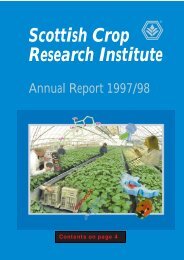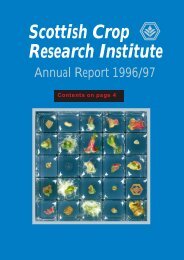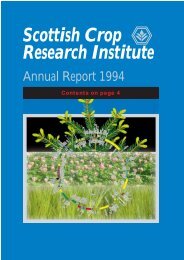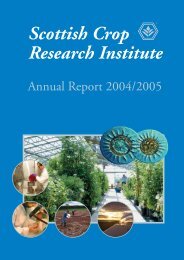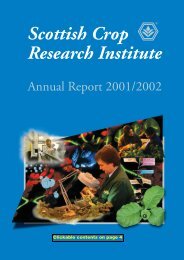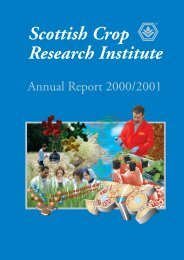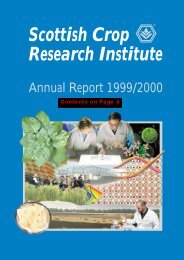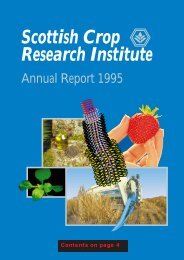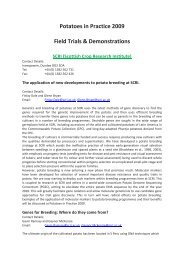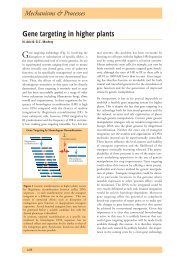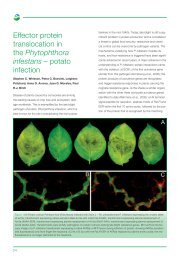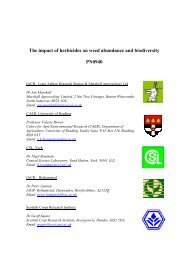PDF file: Annual Report 2002/2003 - Scottish Crop Research Institute
PDF file: Annual Report 2002/2003 - Scottish Crop Research Institute
PDF file: Annual Report 2002/2003 - Scottish Crop Research Institute
Create successful ePaper yourself
Turn your PDF publications into a flip-book with our unique Google optimized e-Paper software.
<strong>Research</strong> services<br />
Finance and Human Resources Unit<br />
N.G. Hattersley & A.Cartwright<br />
The Finance and Human Resources Unit (FHR),<br />
comprises 16 staff covering accounts, contract<br />
management, administration, payroll and human<br />
resources.<br />
The <strong>Institute</strong> employs approximately 350 staff (plus<br />
visiting workers and postgraduate students) and has<br />
income and expenditure of approximately £14 million<br />
with an additional capital grant this year of £2.51 million.<br />
The Unit is responsible not only for the financial<br />
regulation of the <strong>Institute</strong>’s activities but also for providing<br />
training and a human resources service for all<br />
staff.<br />
The HR section plays an important part in the development<br />
of staff and the provision of a positive working<br />
environment, providing support and guidance in<br />
all areas of staff welfare and ensuring that the policies<br />
and procedures in the BBSRC Staff Code are implemented<br />
effectively.<br />
Working with the Senior Management Team, HR<br />
helps to develop a Manpower Plan that meets the<br />
needs of the SCRI Corporate Plan and ensures the<br />
effective recruitment of the staff required throughout<br />
the <strong>Institute</strong>. In <strong>2002</strong>/03 (1 st April <strong>2002</strong> – 31 st<br />
March <strong>2003</strong>) this included advertising 59 posts that<br />
attracted 873 applications from external and internal<br />
sources. HR is also responsible for the operation of<br />
effective induction and probation procedures to<br />
ensure that new staff become productive and effective<br />
members of the <strong>Institute</strong> quickly. On an ongoing<br />
basis HR continues to work with all managers to<br />
ensure that there is effective performance management<br />
throughout an individuals working career.<br />
In addition HR is involved with internal staff committees<br />
in relation to the maintenance and development<br />
of the <strong>Institute</strong>’s IIP status and the promotion<br />
and delivery of a wide range of training and development<br />
activities through the <strong>Institute</strong> Training<br />
Committee. These development activities include IT<br />
training, training in a range of management issues and<br />
appropriate scientific training to continually develop<br />
the skills of staff.<br />
The accounts staff process over 17,000 purchase<br />
invoices per annum, 95% of which are paid within 30<br />
days, utilising the BACS payment system to reduce<br />
the number of cheque payments. Over 1,100 sales<br />
invoices are raised in addition to the claims on grant<br />
aided projects. In addition to the ‘core’ research projects<br />
funded by the <strong>Scottish</strong> Executive Environment<br />
and Rural Affairs Department, additional income is<br />
sought from other external grant awarding bodies and<br />
from industry and the <strong>Institute</strong> carries out research on<br />
about 200 projects which are monitored and supported<br />
by the accounts team, particularly where the<br />
<strong>Institute</strong> acts as the co-ordinating partner for collaborative<br />
projects. The team also maintains over 2,700<br />
items on its fixed asset register, ranging from personal<br />
computers to laboratory buildings.<br />
The <strong>Institute</strong> is reliant on the funding from external<br />
bodies to maintain the resources and facilities of the<br />
<strong>Institute</strong>, therefore the development of staff, the monitoring<br />
of the finances and the control of the overhead<br />
expenditure is critical to the management of the<br />
<strong>Institute</strong> and its ability to produce world class science<br />
in an increasingly competitive research environment,<br />
both in terms of funding and output. This year has<br />
seen a reduction in research funding by commercial<br />
organisations and the role of budgeting and forecasting<br />
has become increasingly important to maintaining<br />
the financial integrity of the <strong>Institute</strong>, to ensure that it<br />
can respond to the changing demands of the sponsors<br />
and research programmes.<br />
140



